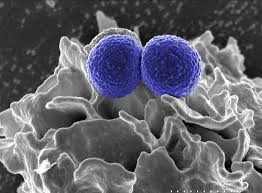By Dane Lorica, | November 08, 2016

A picture of the Methicillin-resistant Staphylococcus aureus. (Flickr)
Scientists have discovered a bioweapon that could help in stopping the spread of superbugs. Researchers from Massachusetts Institute of Technology (MIT), University of British Columbia, and University of Brasilla have developed a peptide against these antibiotic-resistant microorganisms.
A United Kingdom commission released a report which revealed that bacterial infections can result in millions of deaths by 2050 due to lack of effective antibiotics.
Like Us on Facebook
Clavanin-MO, a synthetic peptide, is a potential antimicrobial and immunomodulator in both in vivo and in-vitro environment. These peptides are derived from a marine tunicate antimicrobial peptide called Clavanin A and are capable of passing through the bacterial cell membranes and disrupting their functions and parts like proteins, DNA, and RNA, resulting in the death of the invading microorganism.
The hydrophobic synthetic peptide has been improved with the addition of a sequence of five amino acids. This water-fearing property makes the peptide capable of effectively interacting and switching membranes.
Cesar dela Fuente of MIT said that "this peptide is exciting in the sense that it provides a new alternative for treating these infections, which are predicted to kill more people annually than any other cause of death in our society including cancer."
In an experiment using mice, clavanin-MO was found to be effective in killing Staphylococcus aureus and E.coli, which are very resistant to antibiotics.
Scientists are now studying the components of the peptide that makes it more potent in killing bacteria compared to its traditional counterparts. With improvement, the bioweapon could be utilized along with existing antibiotics.
-
Use of Coronavirus Pandemic Drones Raises Privacy Concerns: Drones Spread Fear, Local Officials Say

-
Coronavirus Hampers The Delivery Of Lockheed Martin F-35 Stealth Fighters For 2020

-
Instagram Speeds Up Plans to Add Account Memorialization Feature Due to COVID-19 Deaths

-
NASA: Perseverance Plans to Bring 'Mars Rock' to Earth in 2031

-
600 Dead And 3,000 In The Hospital as Iranians Believed Drinking High-Concentrations of Alcohol Can Cure The Coronavirus

-
600 Dead And 3,000 In The Hospital as Iranians Believed Drinking High-Concentrations of Alcohol Can Cure The Coronavirus

-
COVID-19: Doctors, Nurses Use Virtual Reality to Learn New Skills in Treating Coronavirus Patients







